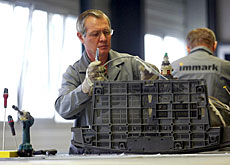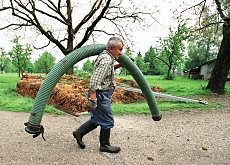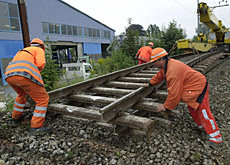Ageing workforce can play greater role

A new generation of active, motivated older employees should be encouraged to extend their working lives beyond the age of retirement, a conference has heard.
Some 70 per cent of 804 firms surveyed have measures in place to retain older workers, with the proportion of the workforce over the age of 50 expected to rise from a quarter to a third by 2020.
The findings were revealed at a conference in Zurich, co-hosted by economic think tank Avenir Suisse and Zurich Cantonal Bank.
George Sheldon, a professor at Basel University, contributed to the study on older people in the Swiss workforce. He says part of the problem is the emphasis on young people.
“A large number of older people have simply been overlooked in the drive to get the younger generation into work,” Sheldon told swissinfo.
“We need to focus on bringing the older generation back into the workplace by introducing incentives.”
Training
Sheldon says more emphasis should be placed on training older people who may be less qualified than younger workers.
“Research has shown that older people today are not only healthier, but use that good health to become more mobile and flexible than ever before.”
Sheldon wants the age of retirement to be made more flexible to allow for a 42-year-long working life regardless of when people start employment.
Switzerland has the highest proportion of workers aged between 55 and 64 years old (70%) of all Organisation for Economic Cooperation and Development (OECD) countries.
But the percentage of over-60s in employment in Switzerland has dropped in the past 30 years, according to the Basel University research.
Concerns
There are concerns in Switzerland, along with many other European countries, that an ageing population combined with a low birth rate will create a hole in the workforce and put more pressure on the social security system in the next two decades.
As a result, many experts are calling on businesses and administration to reverse the early retirement trend of the 1990s and find ways of utilising older workers more effectively.
An Avenir Suisse survey of more than 800 Swiss companies revealed that half have introduced part-time flexibility to encourage employees to stay on at the end of their careers.
In all, 42 per cent have modified the job description of certain posts and nearly two-thirds think it is important to offer sabbaticals and longer holiday periods.
Jobs in the service industry have a higher success rate at keeping people on for longer than in more physically demanding sectors. Older people stand a much greater chance of landing a management position than a junior role, the survey found.
Magic border
Co-author Francois Höpflinger of Zurich University echoed recent calls to do away with the “magic border” of 65 as a rigid retirement age.
In October last year a key government advisory committee on economic questions warned the “dogma” of pensions at age 65 would have to be abandoned.
The Swiss Employers’ Association has called on the retirement age to be raised to 66, and Interior Minister Pascal Couchepin suggested last year that it should go up to 67. But unions have been campaigning for a flexible retirement age starting at 62.
A newspaper survey in January revealed that some large Swiss companies, including ABB, were trying to keep their employees on the payroll beyond the age of 65.
swissinfo, Matthew Allen in Zurich
A study by think tank Avenir Suisse, released this week, found 70% of more than 800 firms surveyed had provisions in place to keep older employees.
Measures included introducing part-time work, making job descriptions more flexible and allowing sabbaticals.
The study also showed 80% of these companies preferred to take on younger people as new employees, but 47% favoured older people for management positions.
The retirement age in Switzerland is currently 64 for women and 65 for men.
Switzerland has more 55-64 year olds working per head of the population than any other OECD country, according to 2003 figures.
Some 70% of Swiss people in this age bracket are in work compared with around 63% in Japan, 55% in the United States and only 27% in Belgium.
The proportion of the workforce aged over 50 in Switzerland is set to rise to about a third from a quarter today.

In compliance with the JTI standards
More: SWI swissinfo.ch certified by the Journalism Trust Initiative




You can find an overview of ongoing debates with our journalists here. Please join us!
If you want to start a conversation about a topic raised in this article or want to report factual errors, email us at english@swissinfo.ch.